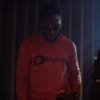Mr. Eazi’s debut project, 2017’s Life Is Eazi, Vol.1: Accra to Lagos, soundtracked an IRL migration for the afrowave artist from Kumasi, Ghana back to his native Nigeria. While attending college in Kumasi, Eazi found himself intimately moved by the highlife and dancehall being made, and eventually started to try his hand at creating his own. He went from being one of his school’s most well-known party promoters to one of the campus’s most celebrated artists with songs like the catchy “Pipi Dance.” Since his debut arrived to critical acclaim and viral Instagram challenges, Eazi has been consistently releasing contagious loose tracks, a few of which featured London’s most exciting artists.
Today, Eazi dropped his sophomore project, Life Is Eazi, Vol. 2: Lagos to London, a thematic follow up to his debut. The project features some of his most well-received tracks over the past year like “Pour Me Water” and “Property,” and also features the likes of Chronixx, Burna Boy, and Simi on previously-unheard tracks. Like Accra to Lagos, the project is split into two halves, reflective of the extended time he’s been spending in London since leaving Nigeria. While he was riding around London promoting the new project, Mr Eazi spoke to The FADER about why migration is so crucial in his music, how he’s improved over the past year, and what stops he’d like to make next on his never-ending musical journey.
When you dropped Accra to Lagos, it was your first time putting together a proper project. In what ways do you feel like you’ve evolved as an artist since then?
With this record, I paid more attention to detail. The last project, some of the songs were not mastered. A lot of it was, ok the song is done, turn up the volume, and put it out. But this time, making sure levels are correct, and being very deliberate in the kind of sounds I wanted to put out. And I made sure I was being discipline in taking out some records because I had the opportunity to get some bigger features but they didn’t go with the theme of the project. It’s some records I really love and feel like I smashed them but they don’t fit.
So when you say you were more deliberate with the sounds you wanted, what sound were you going for with Lagos to London?
I wanted it to be obvious to everybody that when you listen to the Lagos side of the tape that you’re in Lagos, and when you are on the London side of the tape, I didn’t want you to feel like what is this shit? I wanted it to be precise vibes from the U.K.
Did you feel like you weren’t as successful with making those distinctions on Accra to Lagos?
To be honest, I felt like there were some records where you couldn’t precisely tell. I didn’t achieve that maybe because it was more of different producers trying to achieve it independently. But this time, most of the producers — like working with Julz and Pheelz on “Surrender,” we wanted to mix the highlife Lagos feel.
Why has migration been the central theme in both of your projects?
I feel like one, because I’ve been moving around so much and two, just because myself, I’m a nomad. I’ve always liked the concept of traveling. I always wanted to travel as a kid; watching my dad travel and my uncles travel, it was just an exciting concept. That’s the life I’m living right now and that is part of my identity.
Hypothetically speaking, what would be the next exchange if you were to keep this theme going? You’ve done stuff with both Popcaan and Chronixx recently. So maybe to Jamaica?
I and Dre Skull have been working on a couple records, you know, so it might go to Kingston. Or it might go the reggaeton tip. Funny enough, if you look it up, when I first started playing with the idea of doing music, I was very dancehall-influenced. If you look up my songs “Pi Pi Dance” or “Ghana Party,” you’ll see me playing around with that. I love Burna Boy because I hear that flow when he’s on the record. And I love Shatta Wale because he’s like a Vybz Kartel. I feel like it only makes sense because of Dre Skull, and working with Popcaan came naturally. I might meet Chronixx today. One day, I was researching him and watching his interviews, and the next day, the guy who drives me when I’m on tour in the U.K told me he drives Protoje and Chronixx. He started playing their music for me and I loved it. Next thing you know, Chronixx video calls me because the driver played my music for him. So we did the record. And via Diplo, I have some records with Kranium. So if you look at all of it, I’m slowly playing around with that whole scene. And even my “Zagadat” is inspired by Beenie Man. I had to take a few records off this tape because they sounded too dancehall for Lagos.
Do you see particular ways in which your music has changed since working with more artists from various places?
To be honest, what I was telling my manager the other day, a lot of difference between Accra to Lagos and this project is in the production. I feel like the production on this project is more stripped down. I love stripped down because it’s beginning to take me back to some of my most successful records that worked well played live. So perhaps, the more I travel, the more I strip down the production which is always like “Bankulize,” one of my first big records, it was just a single loop on and on with shakers at some point. Working with all these artists is making me realize what works.
What was the most standout experience of putting this project together?
Most times when I’m recording it’s just me and the producer. But for the first time, I welcome the idea of having a couple people in the room while I’m recording — just for the vibe. Every time I think about how this record was made, it’s just interesting to think about me becoming comfortable enough while people are watching and still be myself. It made it not even seem like work. It made it seem like just having fun and bouncing off energies. Even though everybody there wasn’t writing, everybody there was contributing with their energy, which is interesting. The day I recorded “London Town” there was probably 10 or 15 people in the room.

